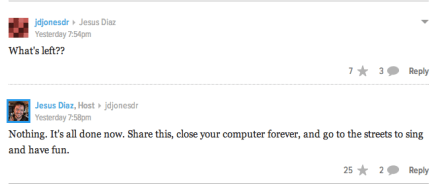Happy New Year! Hopefully 2015 will bring as many changes, challenges, stories, and monsters as 2014.
Sadly there is one thing that won’t be returning in the new year. After nine seasons on television, The Colbert Report, starring the satirical right-wing persona Stephen Colbert, ended on December 18, 2014. Multiple articles have talked about the political mark Colbert has left on television and on the USA, but today I’m interested in something a little less “real-world”. In addition to his interest in politics, Stephen Colbert is a huge nerd.
During the penultimate week of the show Colbert had a special guest star: Smaug from The Hobbit. Smaug came to promote the third and final Hobbit film, The Battle of the Five Armies, which hit cinemas in December. You can watch the interview on Colbert’s website, or here via YouTube:
Not only do I find this interview hilarious, particularly with its references Sherlock actors Benedict Cumberbatch (who also voices Smaug in the film adaptations of The Hobbit) and Martin Freeman (who plays Bilbo Baggins), and its caricature of Smaug as a Republican one-percenter – I’m also hoping it represents a continuing trend of glorifying the monster. Over the last few decades there’s been a marked increase in the number of stories told by the bad guy. Culture blog i09.com even had a recent post asking people to list their favourite re-tellings of stories from the villain’s perspective. There are any number of reasons why we find monsters and antiheroes fascinating, and recent pop culture has seen the development of enticingly multi-layered villains, but to be honest, I’m interested in stories that play with monsters in this way for another reason.
When we get right down to it, sympathising with the monsters gives us great practice in humanising people we might otherwise hate. By thinking at length about the reasons that people have for doing strange or terrible things, and imagining what those reasons might be creates empathy. Every single one of us, knowingly or unwittingly, has a group of people that we demonise. Sometimes the hatred that we feel towards these people is earned, but more often our vilification of them is linked to processes of which we are largely unaware. We dehumanise them so we don’t have to feel bad about hating or harming them, and so we can feel better about ourselves. While there are also negative sides to such empathy, in the best of cases, sympathising with the bad guy trains us to think before we assume. Who can ever think the same way about evil henchmen again once they’ve watched the scene below, from Austin Powers: International Man of Mystery (1997)?
What would the world be like if we imagined a similar story for every person we hated or considered to be monstrous?
